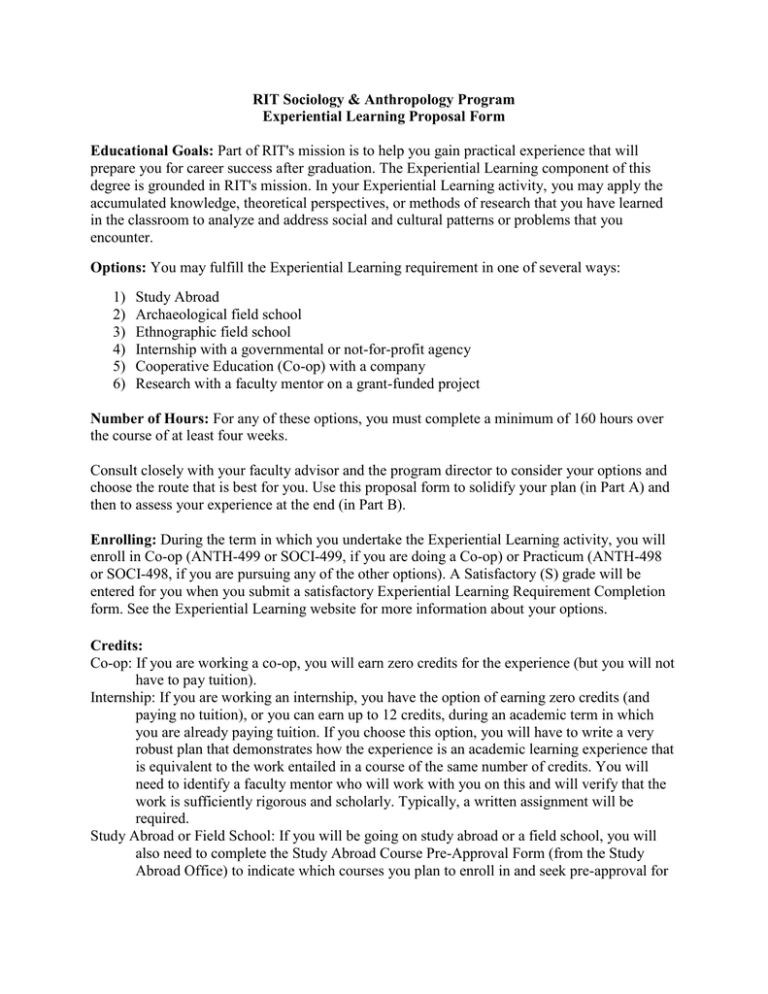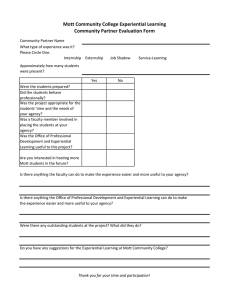Experiential Learning form
advertisement

RIT Sociology & Anthropology Program Experiential Learning Proposal Form Educational Goals: Part of RIT's mission is to help you gain practical experience that will prepare you for career success after graduation. The Experiential Learning component of this degree is grounded in RIT's mission. In your Experiential Learning activity, you may apply the accumulated knowledge, theoretical perspectives, or methods of research that you have learned in the classroom to analyze and address social and cultural patterns or problems that you encounter. Options: You may fulfill the Experiential Learning requirement in one of several ways: 1) 2) 3) 4) 5) 6) Study Abroad Archaeological field school Ethnographic field school Internship with a governmental or not-for-profit agency Cooperative Education (Co-op) with a company Research with a faculty mentor on a grant-funded project Number of Hours: For any of these options, you must complete a minimum of 160 hours over the course of at least four weeks. Consult closely with your faculty advisor and the program director to consider your options and choose the route that is best for you. Use this proposal form to solidify your plan (in Part A) and then to assess your experience at the end (in Part B). Enrolling: During the term in which you undertake the Experiential Learning activity, you will enroll in Co-op (ANTH-499 or SOCI-499, if you are doing a Co-op) or Practicum (ANTH-498 or SOCI-498, if you are pursuing any of the other options). A Satisfactory (S) grade will be entered for you when you submit a satisfactory Experiential Learning Requirement Completion form. See the Experiential Learning website for more information about your options. Credits: Co-op: If you are working a co-op, you will earn zero credits for the experience (but you will not have to pay tuition). Internship: If you are working an internship, you have the option of earning zero credits (and paying no tuition), or you can earn up to 12 credits, during an academic term in which you are already paying tuition. If you choose this option, you will have to write a very robust plan that demonstrates how the experience is an academic learning experience that is equivalent to the work entailed in a course of the same number of credits. You will need to identify a faculty mentor who will work with you on this and will verify that the work is sufficiently rigorous and scholarly. Typically, a written assignment will be required. Study Abroad or Field School: If you will be going on study abroad or a field school, you will also need to complete the Study Abroad Course Pre-Approval Form (from the Study Abroad Office) to indicate which courses you plan to enroll in and seek pre-approval for how they will count toward your degree requirements. Include that form with this proposal. PART A: PROPOSAL FOR EXPERIENTIAL LEARNING Indicate which you plan to do: Study Abroad Archaeological field school Ethnographic field school Internship with a governmental or not-for-profit agency Cooperative Education (Co-op) with a company Research with a faculty mentor on a grant-funded project Name of agency, company, study abroad program, field school program, or research project: Location: Dates (inclusive): Which academic term: Name of supervisor (for internships, co-ops, or research project): Supervisor's email address: Supervisor's telephone number: If you will be pursuing study abroad or a field school, which courses will you enroll in? 1. 2. 3. 4. 5. Total number of credits sought (see paragraph above): If you are pursuing an internship with academic credits, indicate which faculty member has agreed to be your internship advisor: If you are pursuing an internship with academic credits, provide a two-paragraph proposal of your plan and describe how it will be sufficiently rigorous and academic: If you will be working on a grant-funded research project with a faculty mentor, provide a oneparagraph proposal of your plan: Your Educational Goals: Briefly describe why you chose this Experiential Learning activity and how it fits with your educational and career goals: Proposal Approvals: Student: Date: Faculty advisor: Date: Program (Co-)Director: Date: PART B: EXPERIENTIAL LEARNING COMPLETION 1. If you have completed an internship, Co-op, or work on a grant-funded research project, have your supervisor contact the Experiential Learning Coordinator to affirm that you have completed the necessary number of hours (160). 2. In a paragraph, please indicate whether the Experiential Learning activity helped you advance your educational and career goals, and if so, how: 3. Our aim is that the Experiential Learning activity will give you some practical familiarity with how you might apply the perspectives, theories, methods, and accumulated knowledge of sociology, anthropology, and/or urban studies to address contemporary social problems. Did your Experiential Learning activity help you achieve this? In a paragraph, please explain your "yes" or "no" answer. 4. If you found yourself dissatisfied with the Experiential Learning activity, please explain why and offer a suggestion for how it might be improved so that we may better assist other students: Your name: Date:
